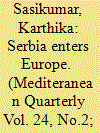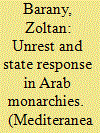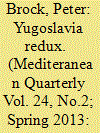|
|
|
Sort Order |
|
|
|
Items / Page
|
|
|
|
|
|
|
| Srl | Item |
| 1 |
ID:
120906


|
|
|
|
|
| Publication |
2013.
|
| Summary/Abstract |
This essay reviews and analyzes Albania's connections with the Middle East since the era of Enver Hoxha's rule, when ideology was a strong factor in international relations. Since the end of the Cold War, Albania has been most interested in developing political, economic, and cultural ties, especially with Turkey, Israel, and the Arab states of the Persian Gulf region. Through its modern history, Albania has been a good example of a politically and economically weak state exercising a fairly consistent asymmetric foreign policy based on the support of great powers and their allies.
|
|
|
|
|
|
|
|
|
|
|
|
|
|
|
|
| 2 |
ID:
120905


|
|
|
|
|
| Publication |
2013.
|
| Summary/Abstract |
In 2009, citizens of Serbia were finally allowed to make short trips to Schengen zone countries without visas. This represented a victory for the regime in Belgrade. A whole generation of Serbians had been held back from European travel by the visa requirement that was introduced as Yugoslavia disintegrated. However, this victory came at a price. Schengen countries worried that the lifting of the visa barrier would trigger a flood of illegal workers and asylum seekers from Kosovo. The Serbian government, which considers Kosovo to be an autonomous province, had to come up with an expedient solution to reassure wealthier European countries that allowing Serbians to "enter" would not open the gates to a large number of problematic visitors. Eventually, Belgrade agreed to restrict the privilege of visa-free travel for residents of Kosovo, formally differentiating Kosovar citizens from "normal" citizens. The imperatives of international mobility have forced a country, in a sense, to redraw its boundaries and to acknowledge a different status for a section of its population from a province that it continues to claim. This essay unpacks the puzzle of why supporters of the "integral Kosovo" position in Serbia resigned themselves to the compromise. The central argument is that states seek to secure mobility not only for economic reasons but also to mark themselves as normal, respectable members of the international community. Serbia's visa waiver decision provides a lens with which to view issues of mobility and national identity in one of the most complex and divided regions of the world.
|
|
|
|
|
|
|
|
|
|
|
|
|
|
|
|
| 3 |
ID:
120903


|
|
|
|
|
| Publication |
2013.
|
| Summary/Abstract |
The turmoil associated with the Arab Spring in the region's eight monarchies has received comparatively modest attention because, aside from Bahrain, the demonstrations were mostly small and nonconfrontational, there were few calls to overthrow the regimes, and states' coercive powers were applied with relative moderation. Behind these generalizations, however, lies a more complex reality: the extent of the strife was quite different, as were state actions to counter them across the eight cases. What explains these disparities? This essay argues that the differences in the levels of unrest are largely illuminated by varying degrees of societal support for monarchical regimes, deep-seated societal cleavages, and the deficiencies of political mobilization. The variation in state responses, in turn, is mainly explained by divergent financial resources, the quality of political leadership, and external diplomatic, financial, and security assistance.
|
|
|
|
|
|
|
|
|
|
|
|
|
|
|
|
| 4 |
ID:
120904


|
|
|
|
|
| Publication |
2013.
|
| Summary/Abstract |
Despite the dreadful wars-and the comparable horrors of uncertain "peace"-and against the background of an almost religious knack for recurring Balkan catastrophe, there are warnings that hostilities are reviving in the former Yugoslav republics of Serbia, Croatia, and Bosnia and their substates. Kosovo has redeclared its "independence" for the second time in four years. Ethnic Hungarians are stretching their "autonomy" and prodding for secession in Vojvodina-or will it be "Vojvodinia?"-as former UN peacekeepers (among others) deal with cancer caused by depleted uranium in the former killing fields. Inner migration of hundreds of thousands of displaced persons temporarily plugged holes in Serbia's negative population growth in the midst of a continuous exodus to Europe and anywhere else. Numerous signs point to the potential for renewed and ongoing difficulties in this most difficult of regions. This essay provides an overview of the gathering clouds.
|
|
|
|
|
|
|
|
|
|
|
|
|
|
|
|
|
|
|
|
|